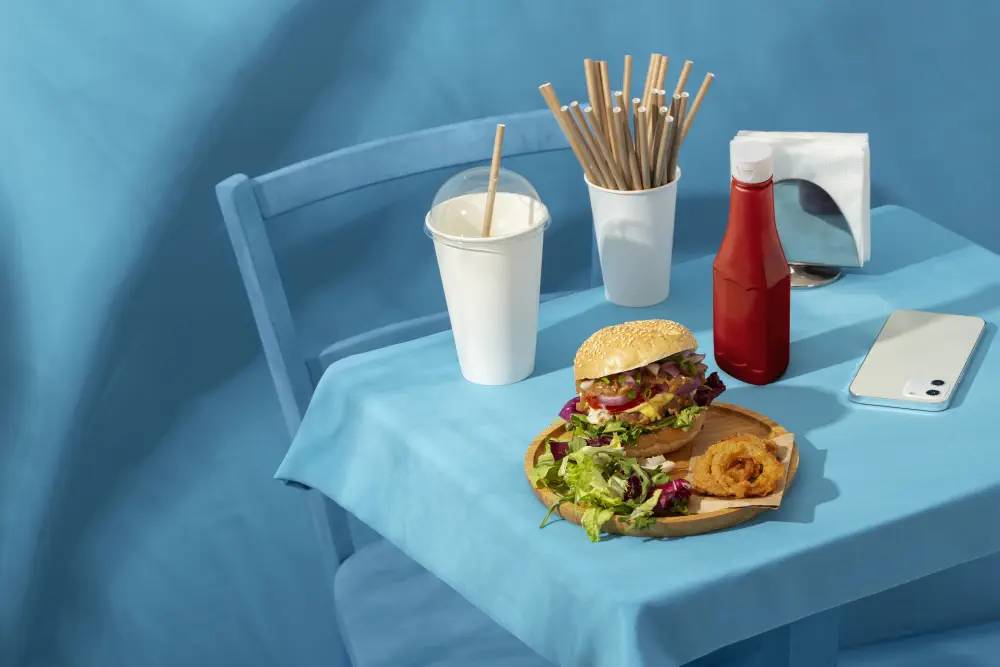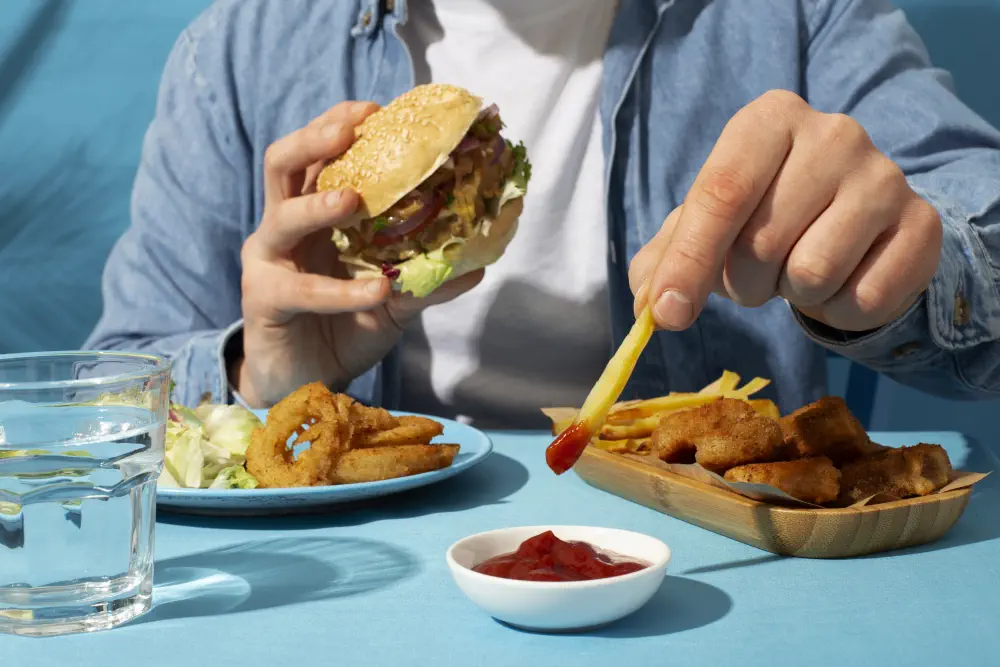We offer medical detox and multiple addiction treatment options in our
luxury treatment centres in Port Hope, Cobourg, and Ottawa.
Fast Food Addiction and Its Impact on Your Health
Ever notice how every corner seems to have a drive-through? Golden arches here, red buckets there. Fast food chains have basically invaded Canadian streets. What started as occasional convenience turned into daily habit for millions.
Here's the kicker: your brain treats a Big Mac like cocaine. Seriously. Scientists have done brain scans proving this. Those perfect combinations of sugar, salt, and fat? They're not accidents. Food companies hire teams of chemists to create the exact ratios that make your brain scream "MORE!"
Try quitting cold turkey. Watch what happens. Headaches kick in. Mood swings follow. Your body literally goes through withdrawal. This isn't some character flaw or lack of willpower - it's brain chemistry gone haywire.

Key Takeaways
- Food engineers design products specifically to hijack ancient reward systems in your brain
- Stopping suddenly causes real withdrawal - headaches, crankiness, obsessive thoughts about food
- Red flags include hiding eating habits and organizing your whole day around restaurant locations
- Your health takes a beating: diabetes, heart problems, depression, energy crashes
- Getting better means therapy, learning nutrition basics, and figuring out emotional triggers
- Going it alone rarely works - professional help makes all the difference
Why Does Fast Food Become Addictive?
Picture laboratories filled with scientists whose only job is making food irresistible. They've cracked the code on something called the "bliss point" - exact measurements of sugar, salt, and fat that light up pleasure centers in your brain.
Natural foods don't stand a chance. An apple gives you a gentle dopamine bump. A McDonald's quarter-pounder delivers a chemical sledgehammer that knocks out your brain's ability to say "enough."
Think about it - our ancestors spent millions of years developing hunger systems to survive famines. Nobody planned for foods designed to overwhelm every single safeguard evolution built. Corn syrup, MSG, artificial everything - these create flavor explosions your brain mistakes for life-saving nutrition.
Here's how addiction takes hold:
- First taste - Your brain files this under "amazing discovery"
- Building tolerance - Same amount stops working, need more
- Obsessive planning - Organizing life around getting the fix
- Losing control - Eating despite knowing it's harmful
The convenience factor makes everything worse. Stressed out? There's a solution 30 seconds away. Exhausted after work? No cooking required. Every time fast food rescues you from a problem, it builds stronger connections between feeling bad and eating specific foods.
Companies know exactly what they're doing. Their ads don't talk about nutrition. They sell comfort. Happy families. Stress relief. Instant solutions to whatever's bothering you.
What Are the Behavioral Signs of Fast Food Addiction?
Spotting the problem means looking past "I just eat out a lot." Real addiction creates specific patterns that slowly take over your decision-making.
The hiding starts early. Eating alone in your car. Throwing away evidence before going home. Making up stories about why you're always stopping at restaurants. Sound familiar? This shame-based secrecy happens with every addiction.
Your whole schedule revolves around food access. Taking the long way to work because it passes your favorite drive-through. Choosing meeting locations based on nearby restaurants. Planning vacations around food chains instead of, you know, actual vacation stuff.
Then come the lies. Little ones at first. "I've been eating healthy all week" (yesterday doesn't count, right?). "Just picking up something for the kids" (while secretly ordering your own meal). These protective deceptions pile up fast.
Other warning signs to watch for:
- Wolfing down food without actually tasting it
- Eating until you feel sick, then continuing anyway
- Immediate guilt and shame after finishing
- Failed promises to yourself about cutting back
- Choosing food over family time, savings, or social activities
- Panic when your usual restaurants aren't available
The emotional stuff gets scary. Bad workday equals drive-through dinner. Fight with your partner means midnight snack run. Bored weekend requires food entertainment. These connections get so strong that fast food becomes your only coping tool.
Physical changes tag along. Energy crashes after eating. Stomach problems that keep getting worse. Mood swings tied to meal timing. Sleep gets messed up from late-night eating or blood sugar roller coasters.
Social life starts shrinking. Avoiding family dinners because you already ate. Turning down invitations that don't include your preferred foods. Lying to doctors about what you actually eat.

How Does Your Body React During Food Withdrawal?
Stop eating fast food regularly and your body stages a revolt. This proves addiction is real - you get genuine physical and mental symptoms when the artificial stimulation disappears.
Headaches usually hit first, within a day. Your blood sugar has been on a crazy roller coaster for months or years. When it tries to level out naturally, withdrawal pain starts. We're talking serious headaches here, not just mild discomfort.
Fatigue feels different than normal tiredness. Your cells got used to quick sugar rushes followed by crashes. Switching to steady energy from real food feels sluggish at first, even though it's way healthier long-term.
Mood changes surprise everyone with their intensity. Minor annoyances trigger explosive anger. Anxiety spikes for no obvious reason. Depression hits like a truck as dopamine levels try to find normal again.
Withdrawal follows a pretty predictable timeline:
- First 24 hours: Cravings start, mood gets shaky
- Days 1-3: Peak misery - headaches, exhaustion, irritability
- Days 4-7: Psychological symptoms get worse, sleep problems
- Week 2: Slow improvement with occasional intense urges
- Weeks 3-6: Finding new normal, developing different eating patterns
Sleep goes haywire as your body adjusts. All that sodium messes with fluid balance and blood pressure. Sugar crashes that used to trigger late-night eating stop happening, throwing off your natural sleep-wake cycle.
Food dreams become incredibly vivid and common. People report intensely realistic dreams about eating their old favorites, waking up feeling guilty despite not actually consuming anything. Shows how deep these patterns go in your subconscious.
Concentration becomes nearly impossible. Tasks requiring sustained attention feel overwhelming. Making decisions about anything seems exhausting. These brain fog symptoms usually clear up within two weeks but can be alarming initially.
What Health Problems Does Fast Food Addiction Cause?
Health consequences go way beyond gaining weight. Some problems show up immediately while others sneak up over years before causing obvious damage.
Blood sugar chaos starts right away with regular processed food eating. High glycemic ingredients cause dramatic spikes followed by crashes that leave you exhausted and desperately craving more sugar. Eventually this pattern breaks your insulin system, leading straight to diabetes.
Your heart takes a beating through multiple attack routes. Excess sodium jacks up blood pressure. Trans fats and saturated fats clog arteries like sludge. Inflammation from processed junk accelerates artery damage.
Major health problems hit every body system:
- Heart and blood vessels: High blood pressure, clogged arteries, heart attacks
- Blood sugar system: Insulin resistance, diabetes, obesity, fatty liver
- Digestive system: Gut bacteria destruction, inflammatory bowel problems, nutrient loss
- Brain function: Depression, anxiety, memory issues, attention problems
- Immune system: Chronic inflammation, constant infections, autoimmune triggers
Mental health crashes alongside physical health. Your gut and brain are directly connected - mess up digestion and mood regulation follows. Nutrient deficiencies kill serotonin and dopamine production, making depression and anxiety much worse.
Sleep quality tanks with regular fast food eating. High sodium disrupts fluid balance. Sugar crashes interrupt natural sleep rhythms. Poor sleep then increases junk food cravings, creating a vicious cycle that's hard to break.
The social and money costs pile up too. Medical bills skyrocket as chronic diseases develop. Work productivity drops from fatigue and mood problems. Relationships suffer when food addiction creates shame, isolation, or fights about eating habits.
When Should You Seek Professional Help for Food Addiction?
Get help when fast food starts controlling your life instead of supporting it. Unlike drug or alcohol addiction where you can avoid the substance completely, food addiction means learning healthy relationships with something you need to survive.
Multiple failed attempts to change eating patterns prove willpower isn't enough. Tried cutting back repeatedly only to return to old habits within days or weeks? Addiction has rewired your brain chemistry beyond personal control.
Clear signs you need professional help:
- Three or more serious attempts to quit that failed
- Eating habits interfering with work, relationships, or social life
- Health problems directly caused by diet choices
- Using food as your main way to handle emotional stress
- Feeling completely powerless around certain foods or restaurants
- Constant shame and secrecy about eating behaviors
Family and friends often spot problems before you admit them. When people close to you express real concern about your eating patterns or health changes, their outside perspective cuts through denial that addiction creates.Mental health symptoms alongside eating problems need integrated treatment. Depression, anxiety, trauma, or other psychological issues often drive addictive behaviors. You can't treat one without addressing the other. Addiction treatment that tackles both gives you the best shot at lasting recovery.

How Do Treatment Programs Address Fast Food Addiction?
Effective programs understand that food addiction needs different approaches than substance dependencies. Treatment mixes medical monitoring, therapy, nutrition education, and emotional support to address all the factors driving addictive eating.
Cognitive-behavioral therapy forms the backbone of most programs. Therapists help identify emotional triggers driving consumption, build alternative coping strategies, and rewire thought patterns supporting addictive behaviors.
Nutrition counseling tackles the practical stuff - meal planning, grocery shopping, cooking basics. Dietitians explain how different foods affect brain chemistry, energy, and mood. Learning about blood sugar regulation helps you make informed choices.
Individual counselling digs into your personal history with food, family eating patterns, and trauma experiences. Many people discover their food addiction started as a way to cope with underlying anxiety, depression, or emotional pain.
Group therapy connects you with others facing similar struggles. Sharing strategies and experiences reduces isolation while building accountability. Medical supervision ensures safe withdrawal management and tracks health improvements.
What Challenges Arise During Food Addiction Recovery?
Recovery creates unique obstacles since you can't avoid food completely. This requires sophisticated strategies for managing ongoing exposure to potentially triggering substances.
Social pressure never stops in our food-obsessed culture. Birthday parties, work meetings, family gatherings - everything revolves around food choices that might trigger addictive responses. Learning to participate without compromising recovery takes serious communication skills and planning.
Convenience culture fights against recovery constantly. Fast food ads everywhere. Crazy busy schedules making meal prep feel impossible. Society treating processed food as totally normal creates environmental pressure supporting addictive patterns.
Emotional eating triggers stick around long after physical withdrawal ends. Work stress, relationship fights, unexpected life events - any of these can reactivate powerful cravings. Building alternative coping mechanisms takes months of consistent practice.
Perfectionism destroys recovery efforts before they really start. One "slip" triggers shame spirals leading to complete abandonment of recovery goals. Learning that sustainable recovery means progress, not perfection, helps maintain motivation through inevitable setbacks.

When Should You Seek Help?
Fast food addiction is a real medical condition requiring professional treatment, not just willpower. Brain chemistry changes mirror substance dependencies, making specialized help crucial for lasting success.
Getting help early prevents serious health complications and improves your chances dramatically. Waiting until major health problems develop makes recovery harder and more expensive.
The Canadian Centre for Addictions offers comprehensive addiction treatment programs designed specifically for food addiction. Professional guidance helps navigate unique challenges while building sustainable eating patterns supporting long-term health and recovery.
FAQ
How long do food withdrawal symptoms typically last?
Physical symptoms peak within 3-5 days and mostly resolve within two weeks, though psychological cravings can stick around for months.
Can someone be addicted to fast food without being overweight?
Absolutely. Food addiction involves brain chemistry changes, not just calories. People might compensate through exercise or have different metabolisms while still experiencing real addiction symptoms.
Are certain people more genetically predisposed to food addiction?
Research shows genetic differences in dopamine receptors and impulse control increase addiction risk, especially in families with addiction or eating disorder histories.
How does fast food addiction affect children differently than adults?
Kids' developing brains are way more vulnerable to addiction formation. Early exposure creates lifelong taste preferences that become extremely difficult to change later.
What role does advertising play in developing fast food addiction?
Marketing deliberately targets psychological triggers using neuroscience research to link products with emotional comfort and instant gratification, especially affecting vulnerable groups.





